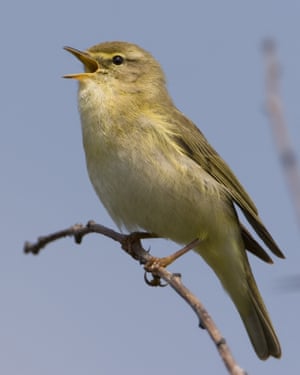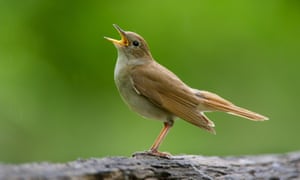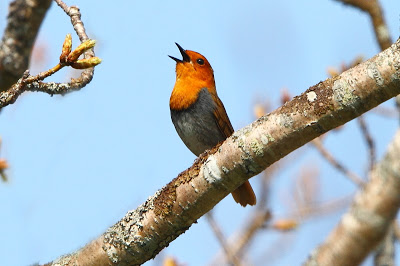Dawn chorus day is a good time to celebrate the benefits to mental and physical health of birdsong – and fight for beloved species facing extinction
When I hear the first willow warbler of the spring, the first cuckoo, or the first booming bittern on my local patch, I feel an enormous sense of comfort and satisfaction. As the poet Ted Hughes wrote about the annual return of swifts, “They’ve made it again, which shows that the globe’s still working…”
It’s International Dawn Chorus Day on Sunday 5 May, and this year the RSPB has released a single of birdsong (currentlyat number 11 in the charts) as part of a campaign to draw attention to the dire situation facing British birdlife. Populations of once-common species such as the house sparrow, starling and swift are falling fast, while the nightingale, turtle dove and grey partridge are rapidly sliding towards extinction in Britain.
Climate change, intensive farming and pollution are just some of the genuinely existential threats to the future of our birds. And, indeed, to us. Having been a naturalist since before I can remember – more than half a century now – I’m always astonished that so many people fail to make the connection between birds’ wellbeing and our own.
Spending time connecting with the natural world is the perfect antidote to the pressures of modern life. Getting close to nature – and especially listening to birdsong – doesn’t just bring us physical benefits – it also helps improve our mental and emotional health, happiness and wellbeing. And this isn’t just some warm, fuzzy feeling.
Scientists at the University of Surrey have been studying the “restorative benefits of birdsong”, testing whether it really does improve our mood. They discovered that, of all the natural sounds, bird songs and calls were those most often cited as helping people recover from stress, and allowing them to restore and refocus their attention.
What we hear is the males of each species saying “Keep out!” to every other male, and “Come in!” to every female
In other words, birdsong is good for you – something that will hardly come as a surprise to those who tune in to Radio 4 six mornings a week to catch its 90-second Tweet of the Day.
This spring, I’ve been taking people out to listen to birdsong near my home, on the Avalon marshes in Somerset. I’m always struck by their sense of wonder at this daily wall of sound, made by so many different species. But I’m also interested in the way they choose very human imagery to describe what they hear: words such as “performers” and “orchestra” as well as “dawn chorus”.
Sometimes I hesitate to explain what is really going on, for fear of breaking the spell. For, however much we think the birds are singing to delight us, this is of course a biological process – a life-or-death struggle between individual singers.

Put simply, what we hear is the males of each species saying “Keep out!” to every other male in the vicinity, and “Come in!” to every female. Birdsong may sound beautiful, but it is all about the race to reproduce.
For a bird like the nightingale I heard singing in Kent last week, this is a crucial time of year. This male had just flown more than 2,500 miles from its winter quarters in west Africa, arriving back a week or so ahead of any females. As soon as it gets here, it must sing its complex, haunting song for hours on end, by day and night, to ensure that he keeps hold of its territory.
If it does, it will be one of those chosen to mate when the females return. Most songbirds live only a year or two, so if it loses out this year, it may never get the chance to breed again.
Life is tough for this nightingale, and for all our migratory songbirds. And it’s not as if we don’t care. The RSPB has more than 1.2 million members, and Springwatch is one of the most popular programmes on TV. Our love of birds is deeply rooted in our very being.
For centuries, we have celebrated them in song, prose and verse. From Chaucer to Shakespeare, Wordsworth to John Clare and Shelley to the Beatles, birdsong looms large in both our literary and popular culture.Advertisement
The other night, I attended an event hosted by singer and musician Sam Lee. His show, Singing with Nightingales: Live, is a unique blend of music, folk tales and birdsong, in which Lee and his colleagues celebrate the wonder and beauty of the nightingale’s song, complete with a live feed from a wood in West Sussex. It left the audience feeling truly humbled, while reminding me of the continuing power of birdsong to inspire and move us.
It’s vital that we preserve this birdsong. When the RSPB was founded, the biggest issue was the slaughter of birds for their feathers, which were used to adorn hats.

Today, the problems are far more serious. That’s why, earlier this week, I joined a group of actors, artists, singers, scientists, poets, conservationists and campaigners – including Lee – in signing a letter asking the UK government to heed this alarm call from nature.
If you weren’t up early enough this morning to listen to the dawn chorus, it’s not too late. The birds will still be singing tomorrow, and the next day, and hopefully next spring, too. But as we contemplate what has happened to Britain’s birdlife over the past half century, can we really be sure that they will still be singing in 50 years’ time? I’m not sure that we can.
Stephen Moss is a naturalist and author based in Somerset, and course leader of the MA in travel and nature writing at Bath Spa University

